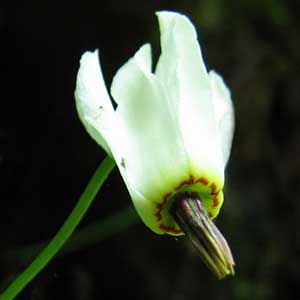Dodecatheon dentatum
Dodecatheon jeffreyi
dentate shooting star, tooth American cowslip, white shooting star
Jeffrey's shooting star, Sierra shootingstar, tall mountain shooting star
not obvious at anthesis, or sometimes erect to slightly horizontal, slender;
roots white or reddish;
bulblets absent.
not obvious at anthesis or usually horizontal, relatively short and thick or elongate and slender;
roots usually white;
bulblets absent.
(3.5–)8–20(–30) × (1–)2.5–6(–7) cm;
petiole slightly winged;
blade ovate, base decurrent onto stem, abruptly tapering to petiole, margins subentire to sinuate or crenate, surfaces glabrous.
(2.5–)7–40(–53) × (0.5–)1–6(–7.5) cm;
petiole winged;
blade narrowly oblanceolate or oblanceolate to spatulate, base decurrent onto stem, usually gradually tapering to petiole, margins entire or crenate to serrulate, surfaces glabrous or glandular-pubescent.
(1–)2–5(–11)-flowered;
bracts lanceolate, 1.5–5(–8) mm, glabrous.
3–20-flowered;
bracts lanceolate to broadly lanceolate, 3–17 mm, glandular-pubescent.
0.8–5 cm, glabrous.
2–7 cm, usually glandular-pubescent, rarely glabrous.
calyx light green, 4–6 mm, glabrous, tube 2–3.5 mm, lobes 5, 1.5–3(–4) mm;
corolla tube yellow with red, thin, wavy ring, lobes 5, white, 7–18(–20) mm;
filaments distinct, maroon to black, 0.1–0.5 mm;
anthers (4.5–)5–7.5 mm;
pollen sacs maroon to black, connective dark purple to maroon, smooth;
stigma not enlarged compared to style.
calyx green, 7–12(–15) mm, usually glandular-pubescent, rarely glabrous, tube 2–4 mm, lobes 4–5, 4.5–8(–12) mm;
corolla tube cream or (rarely) yellow with reddish to purplish, thin to thick, often wavy ring, ring rarely absent, lobes 4–5, magenta to lavender or light yellow to whitish, 10–25(–27) mm;
filaments distinct or partially connate, dark maroon to black, usually 1–1.5 mm;
anthers 6.5–11 mm, (apex truncate to obtuse);
pollen sacs yellow or maroon, connective purplish, transversely rugose;
stigma enlarged, diam. no more than 2 times style.
pale greenish to tannish, dark yellow apically, valvate, narrowly ovoid, (6–)8–11 × 3–5 mm, glabrous;
walls thin, pliable.
yellowish tan to reddish brown, operculate or sometimes valvate, sometimes both on same plant, ovoid, 7–11(–15) × 4.5–7(–10) mm, glabrous or teeth sometimes sparsely glandular-puberulent;
walls thin, pliable.
without membrane along edges.
with thin membrane along edges.
= 44.
= 42, 44, 66, 86.
Dodecatheon dentatum
Dodecatheon jeffreyi
Dodecatheon dentatum occurs mainly on the eastern slope of the Cascade Range from south-central British Columbia to central Washington, with disjunct populations near the Columbia River in southwestern Washington, the Columbia River Gorge, northeastern Oregon, and northern Idaho. In Idaho, this species occasionally forms hybrids with D. pulchellum var. pulchellum (Oberle 262, MO).
(Discussion copyrighted by Flora of North America; reprinted with permission.)
Dodecatheon jeffreyi is found in montane places in the Sierra Nevada of California and western Nevada and on the northern coastal ranges and Siskiyou Mountains of northern California and southwestern Oregon. It occurs in the Cascade Ranges of Oregon, Washington, and British Columbia northward to the Kenai Peninsula region of south-central Alaska, often near the coast and especially on the off-shore islands. It is also widely scattered in the mountains of northeastern Oregon, central and northern Idaho, and western Montana, with isolated stations on the Olympic Peninsula of Washington. A single collection (J. Major 2927, GTNP) from Moose Basin, Grand Teton National Park, is the only record from Wyoming.
Dodecatheon jeffreyi is usually readily recognized; in portions of California, the delimitation of it from both D. alpinum and D. redolens can be somewhat arbitrary. Whether this is a breakdown of species boundaries due to hybridization or a shift in their respective morphologies due to overlapping ecological settings is uncertain. In some instances, intermediate plants seem to occur in areas where two of the species occur in proximity. In general, the corolla tube of D. jeffreyi is white except near the ring, where it is yellow. In D. redolens, the entire corolla tube is yellow.
This species is known universally as Dodecatheon jeffreyi, although it was named a year earlier as D. jeffreyanum K. Koch. To avoid the introduction of a name that has never been used for this widespread and sometimes cultivated plant, D. jeffreyanum has been proposed for rejection (J. F. Veldkamp et al. 2008).
(Discussion copyrighted by Flora of North America; reprinted with permission.)
- Local floras:
BC,
CA,
OR,
WA
- Local Web sites:
CalFlora,
CalPhotos,
Flora NW,
PNW Herbaria,
Turner Photog.
WildflowerSearch
iNaturalist (observations)
USDA Plants Database
- LBJ Wildflower Center
- SEINet
- Plants of the World Online
- Encyclopedia of Life
- Wikipedia
- Google Image Search


